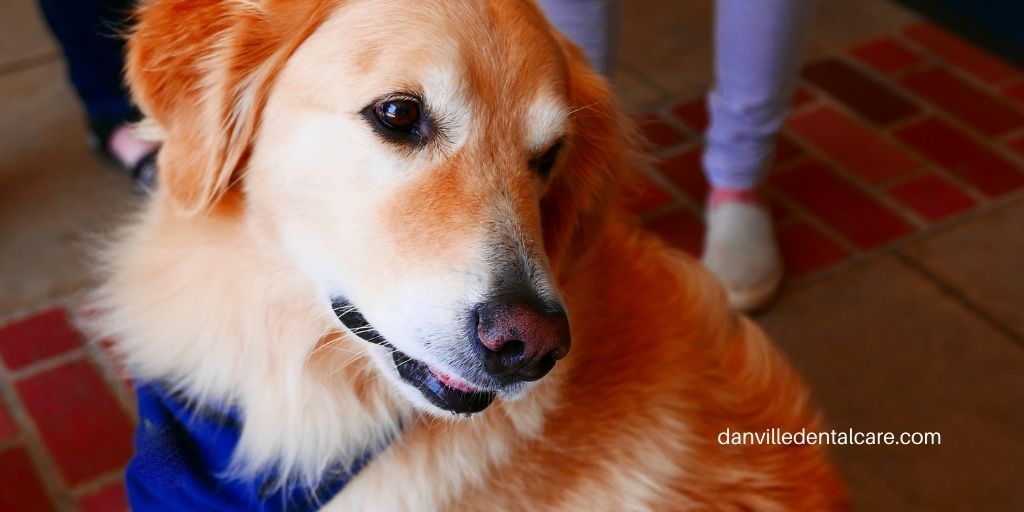We understand that visiting the dentist isn’t usually on your list of “best relaxation ideas.” If dental anxiety is harming your oral health, you’re not alone. Researchers believe that nearly 80% of Americans experience some form of dental anxiety. However, some patients are finding relief in the use of therapy dogs during their dental visits.
Some dentists are looking for unique and innovative ways to relieve their patients’ fear of dental treatment. Successful concepts from other areas of medicine are often transferred, and one such idea is the use of therapy dogs. Many dentists are actively adapting to assist fearful patients using this unique method that involves furry friends.
Therapy Dogs: A Unique Idea for Fearless Dental Appointments
Therapy dogs are specially trained dogs, which help anxious patients. They are used for their calming presence and offer soothing distraction and calming reassurance. The four-legged companions have proven themselves particularly useful for children or patients with autism to alleviate dental fear.
While therapy dogs aren’t widely used in dental settings yet, they are used in many other healthcare settings such as hospitals and nursing homes. Some of their guidelines in animal-assisted interventions can easily be adapted to the dentist’s office. These include:
- Establishing confirmed consent
- Considering allergies
- Keeping office space and equipment sterile and disinfected
- Using professionally trained dogs
Why Therapy Dogs Are A Great Solution in Easing Dental Anxiety and Fear
Humans have evolved with dogs for thousands of years, during which our prehistoric ancestors were concerned about getting their next meal or worrying about predators. Dogs were our first form of therapy and protection, helping humans hunt and comforting them in dire times when they were struggling for survival. As we’ve evolved, our bond with our furry friends has only grown stronger.
Dogs are scientifically proven to make us feel better. They increase the body’s oxytocin production, a hormone made by the brain that is critical to the healing process. Additionally, merely being in the presence of a dog lowers our stress hormone, cortisol.
A pilot study of dog-assisted therapy in a dental setting took place in 2019 to evaluate how humans react to dental stress after introducing a therapy dog into the process. Blood pressure and pulse were taken at different times during a dental procedure while the patient was holding or petting a dog. Patients showed a significant reduction in fear and anxiety, and their vital signs proved that the therapy dog made a major difference in their stress levels.
Therapy dogs are an enormous favorable draw for children and adults who have dental phobias. The excitement of meeting a new furry friend encourages children to regularly visit the dentist while having the welcome distraction of a calming pet assistant soothes even the most nervous patients.
It’s important to note that a well-behaved, properly cared for, healthy, and vaccinated four-legged friend does not pose any health risk. According to the Centers for Disease Control (CDC), there is no evidence that dogs pose any more risk of transmitting infection than humans.
Maybe you find that dental appointments are uncomfortable or cause anxiety. Perhaps you have children who dread the dentist. This normal fear of dental treatment often leads to postponing the visit for an unnecessarily long time or even canceling the appointment at the last minute. Inevitably this builds up more stress and tension and can lead to poor oral health or serious dental problems.
Although we aren’t currently implementing a therapy dog as part of our practice, the compassionate team at Danville Family Dentistry understands your anxiety. We can work with you to help you overcome your fears and keep your oral health top-notch. Call us today at 317-745-4400 to discuss your options.
Are you on Facebook? We are, too! Let’s be friends!
Disclaimer: The information included in this article is for educational purposes only. It should not be used as a substitute for professional medical advice, diagnosis or treatment.


 (317) 745-4400
(317) 745-4400 info@danvilledentalcare.com
info@danvilledentalcare.com